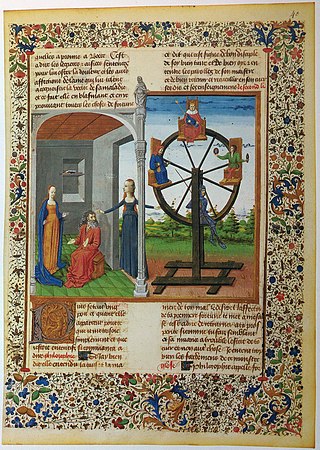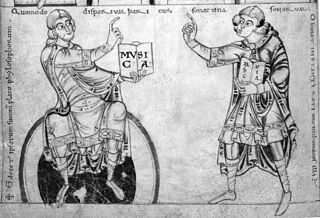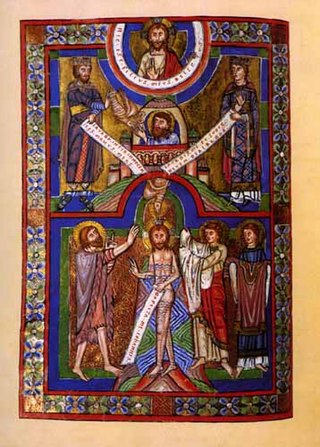
On the Consolation of Philosophy, often titled as The Consolation of Philosophy or simply the Consolation, is a philosophical work by the Roman philosopher Boethius. Written in 523 while he was imprisoned and awaiting execution by the Ostrogothic King Theodoric, it is often described as the last great Western work of the Classical Period. Boethius' Consolation heavily influenced the philosophy of late antiquity, as well as Medieval and early Renaissance Christianity.
Latin literature includes the essays, histories, poems, plays, and other writings written in the Latin language. The beginning of formal Latin literature dates to 240 BC, when the first stage play in Latin was performed in Rome. Latin literature flourished for the next six centuries. The classical era of Latin literature can be roughly divided into several periods: Early Latin literature, The Golden Age, The Imperial Period and Late Antiquity.

Publius Ovidius Naso, known in English as Ovid, was a Roman poet who lived during the reign of Augustus. He was a younger contemporary of Virgil and Horace, with whom he is often ranked as one of the three canonical poets of Latin literature. The Imperial scholar Quintilian considered him the last of the Latin love elegists. Although Ovid enjoyed enormous popularity during his lifetime, the emperor Augustus exiled him to Tomis, the capital of the newly-organised province of Moesia, on the Black Sea, where he remained for the last nine or ten years of his life. Ovid himself attributed his banishment to a "poem and a mistake", but his reluctance to disclose specifics has resulted in much speculation among scholars.
Alexander Neckam was an English poet, theologian, and writer. He was an abbot of Cirencester Abbey from 1213 until his death.

Nicomachus of Gerasa was an Ancient Greek Neopythagorean philosopher from Gerasa, in the Roman province of Syria. Like many Pythagoreans, Nicomachus wrote about the mystical properties of numbers, best known for his works Introduction to Arithmetic and Manual of Harmonics, which are an important resource on Ancient Greek mathematics and Ancient Greek music in the Roman period. Nicomachus' work on arithmetic became a standard text for Neoplatonic education in Late antiquity, with philosophers such as Iamblichus and John Philoponus writing commentaries on it. A Latin paraphrase by Boethius of Nicomachus's works on arithmetic and music became standard textbooks in medieval education.

William of Conches, historically sometimes anglicized as William Shelley, was a medieval Norman-French scholastic philosopher who sought to expand the bounds of Christian humanism by studying secular works of classical literature and fostering empirical science. He was a prominent Chartrain. John of Salisbury, a bishop of Chartres and former student of William's, refers to William as the most talented grammarian of the time, after his former teacher Bernard of Chartres.
Gaius Marius Victorinus was a Roman grammarian, rhetorician and Neoplatonic philosopher. Victorinus was African by birth and experienced the height of his career during the reign of Constantius II. He is also known for translating two of Aristotle's books from ancient Greek into Latin: the Categories and On Interpretation. Victorinus had a religious conversion, from being a pagan to a Christian, "at an advanced old age".

The four senses of Scripture is a four-level method of interpreting the Bible. In Christianity, the four senses are literal, allegorical, tropological and anagogical. In Kabbalah the four meanings of the biblical texts are literal, allusive, allegorical, and mystical.

The Renaissance of the 12th century was a period of many changes at the outset of the High Middle Ages. It included social, political and economic transformations, and an intellectual revitalization of Western Europe with strong philosophical and scientific roots. These changes paved the way for later achievements such as the literary and artistic movement of the Italian Renaissance in the 15th century and the scientific developments of the 17th century.
Remigius (Remi) of Auxerre was a Benedictine monk during the Carolingian period, a teacher of Latin grammar, and a prolific author of commentaries on classical Greek and Latin texts. He is also accredited with collecting and compiling other early medieval thinkers' commentaries on these works.

Conrad of Hirsau or Hirschau was a German Benedictine monk and writer at the Hirsau Abbey. He is known for his literary work Dialogus super auctores, an accessus ad auctores written about 1130. Conrad identified himself as a "modern" in literary terms. His Dialogus is "the only theoretical discussion of the technique of the accessus [ad auctores] that has come down to us from medieval times". His own selection of authors consists of Aesop, Avianus, Boethius, Cato, Cicero, Donatus, Homer, Juvenal, Lucan, Ovid, Persius, Prosper, Prudentius, Sallust, Sedulius, Statius, Virgil and Theodulus.
Bernard of Utrecht was a cleric of the late eleventh century, known for an allegorical commentary on the Eclogue of Theodulus, a standard Latin school text. According to its modern editor R. B. C. Huyghens, in it "students of the history of medicine will find the earliest mention of autopsy, philosophers the oldest quotation from the "Florentina," the Latin version of Aristotle's "Analytica priora", and historians the oldest version of the malicious story of the pact between the devil and pope Sylvester II."

The transmission of the Greek Classics to Latin Western Europe during the Middle Ages was a key factor in the development of intellectual life in Western Europe. Interest in Greek texts and their availability was scarce in the Latin West during the Early Middle Ages, but as traffic to the East increased, so did Western scholarship.
The anonymous Digby Mythographer was the compiler of a twelfth-century Fulgentian handbook of Greek mythology, De Natura deorum that is conserved among the Digby Mss, collected by Sir Kenelm Digby, now in the Bodleian Library, Oxford. An intensely renewed interest in the classics, extending to classical mythography in Latin texts, was expressed in twelfth-century France and England, an aspect of the reviving humanism of the twelfth-century renaissance. Myth was read in allegorical mode, where the surface detail was simply the visible cloak (integumentum) of the hidden Platonic truths they bodied forth. Medieval commentaries on Boethius, Martianus Capella, Ovid, and Virgil also reached a peak during this period, under the impetus of the new cathedral schools.
The Isagoge or "Introduction" to Aristotle's "Categories", written by Porphyry in Greek and translated into Latin by Boethius, was the standard textbook on logic for at least a millennium after his death. It was composed by Porphyry in Sicily during the years 268–270, and sent to Chrysaorium, according to all the ancient commentators Ammonius, Elias, and David. The work includes the highly influential hierarchical classification of genera and species from substance in general down to individuals, known as the Tree of Porphyry, and an introduction which mentions the problem of universals.

Commentaries on Aristotle refers to the great mass of literature produced, especially in the ancient and medieval world, to explain and clarify the works of Aristotle. The pupils of Aristotle were the first to comment on his writings, a tradition which was continued by the Peripatetic school throughout the Hellenistic period and the Roman era. The Neoplatonists of the Late Roman Empire wrote many commentaries on Aristotle, attempting to incorporate him into their philosophy. Although Ancient Greek commentaries are considered the most useful, commentaries continued to be written by the Christian scholars of the Byzantine Empire and by the many Islamic philosophers and Western scholastics who had inherited his texts.
The consolatio or consolatory oration is a type of ceremonial oratory, typically used rhetorically to comfort mourners at funerals. It was one of the most popular classical rhetoric topics, and received new impetus under Renaissance humanism.

Medieval philosophy is the philosophy that existed through the Middle Ages, the period roughly extending from the fall of the Western Roman Empire in the 5th century until after the Renaissance in the 13th and 14th centuries. Medieval philosophy, understood as a project of independent philosophical inquiry, began in Baghdad, in the middle of the 8th century, and in France and Germany, in the itinerant court of Charlemagne in Aachen, in the last quarter of the 8th century. It is defined partly by the process of rediscovering the ancient culture developed in Greece and Rome during the Classical period, and partly by the need to address theological problems and to integrate sacred doctrine with secular learning. This is one of the defining characteristics in this time period. Understanding God was the focal point of study of the philosophers at that time, Muslim and Christian alike.

Edward Kennard RandFBA, known widely as E.K. Rand or to his peers as EKR, was an American classical scholar and medievalist. He served as the Pope Professor of Latin at Harvard University from 1901 until 1942, during which period he was also the Sather Professor at the University of California, Berkeley, for two terms. Rand is best known for his 1928 work, Founders of the Middle Ages.

Pseudo-Ovid or Pseudo-Ovidius is the name conventionally used to designate any author of a work falsely attributed to the Latin poet Ovid. The term first appears in the second edition of the Lexicon Latinae Linguae Antibarbarum Quadripartitum of Johann Friedrich Nolte in 1744. The collective term for such texts is Pseudo-Ovidiana, which may be defined simply as "works not authored by Ovid that circulated under his name".
![Start of the accessus ad auctores in the Bavarian State Library, MS Clm 19475. The top reads Accessus ouidii ep[isto]lar[um], i.e., "introduction to Ovid's letters". Accessus ovidii epistolarum.png](http://upload.wikimedia.org/wikipedia/en/thumb/d/d0/Accessus_ovidii_epistolarum.png/220px-Accessus_ovidii_epistolarum.png)











